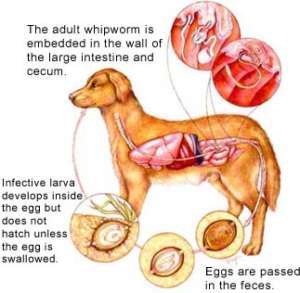Key Takeaways:
- Worms in dogs can be contagious and easily spread to other dogs, as well as humans.
- The most common types of worms in dogs are roundworms, hookworms, whipworms, and tapeworms.
- Symptoms of worms in dogs may include weight loss, diarrhea, vomiting, and a dull coat.
- Regular deworming and preventive measures such as keeping the dog's living area clean can help prevent the spread of worms.
- If a dog is diagnosed with worms, it is important to treat all pets in the household to prevent reinfection.
Are you a dog owner who wants to ensure the health and well-being of your furry friend? If so, then understanding whether worms in dogs are contagious is essential knowledge for you! By delving into this topic, you will not only gain valuable insights into the risks associated with worm infections but also learn how to protect your dog and prevent the spread of these pesky parasites. So, let's embark on this informative journey together as we uncover the truth about worms in dogs and their contagious nature. Get ready to become a responsible and knowledgeable pet owner, armed with the tools to keep your beloved canine companion safe and healthy!
What are worms in dogs and how do they affect their health?
Worms are internal parasites that can live inside a dog's body. They come in different shapes and sizes, but the most common types of worms that infect dogs are roundworms, hookworms, tapeworms, and whipworms. These worms can cause various health problems for dogs if left untreated.
When a dog has worms, it can lead to symptoms such as weight loss, diarrhea, vomiting, a dull coat, and a potbelly appearance. In severe cases, worms can cause anemia (low red blood cell count) or even blockages in the intestines. This can be especially dangerous for puppies or dogs with weakened immune systems.
Common types of worms in dogs:
- Roundworms: These are long, spaghetti-like worms that live in the intestines of dogs. They can be passed from mother to puppy during pregnancy or through contact with contaminated soil.
- Hookworms: Hookworms are tiny worms that attach themselves to the lining of a dog's intestine and feed on blood. Dogs can become infected by ingesting contaminated soil or through their mother's milk.
- Tapeworms: Tapeworms are flat worms made up of segments that look like grains of rice. Dogs usually get infected by ingesting fleas or small animals that carry tapeworm larvae.
- Whipworms: Whipworms are thin worms that reside in the large intestine of dogs. They are usually acquired by ingesting contaminated soil or feces from infected animals.
The Impact on Dog Health:
Worms can have a detrimental effect on a dog's health. They can cause malnutrition, anemia, and damage to the internal organs. In severe cases, they can even be fatal, especially for young puppies or dogs with weakened immune systems.
It is crucial to regularly deworm dogs and take preventive measures to keep them safe from these parasites. Regular veterinary check-ups and fecal examinations are essential to detect and treat worms early on.
Can dogs pass worms to other dogs or even to humans?
Dogs can indeed pass worms to other dogs and, in some cases, even to humans. The most common way for worms to spread among dogs is through the ingestion of infected feces or contaminated soil. When a dog with worms defecates, the eggs or larvae of the worms are expelled along with the feces. If another dog sniffs or licks the infected feces, they can ingest these eggs or larvae and become infected themselves. Additionally, certain types of worms, such as roundworms and hookworms, can also be transmitted to puppies from their mother during pregnancy or through her milk while nursing.
While it is less common for dogs to directly transmit worms to humans, it is still possible. Humans can become infected with certain types of worms by accidentally ingesting worm eggs or larvae present in contaminated soil, water, or food that has been contaminated with dog feces. This is why practicing good hygiene, such as washing hands thoroughly after handling dog waste and ensuring that children do not play in areas where there may be dog feces, is crucial in preventing the transmission of worms from dogs to humans.
Preventing Worm Transmission:
To prevent the spread of worms among dogs and reduce the risk of transmission to humans, it is important to follow these preventive measures:
1. Regular Deworming: Administering regular deworming treatments recommended by your veterinarian helps eliminate any existing worm infestations in your dog and prevents new infections.
2. Proper Hygiene: Always clean up after your dog promptly and dispose of their waste properly. Wash your hands thoroughly after handling dog waste and before eating.
3. Avoid Contaminated Areas: Keep your dog away from areas where there may be a high concentration of dog feces such as public parks or communal spaces.
4. Flea Control: Fleas can carry certain types of worms, so it is essential to use flea control products recommended by your veterinarian to prevent flea infestations.
Conclusion:
While dogs can pass worms to other dogs and, in rare cases, to humans, following preventive measures such as regular deworming, practicing good hygiene, avoiding contaminated areas, and using flea control products can significantly reduce the risk of worm transmission. It is always best to consult with a veterinarian for guidance on deworming schedules and appropriate preventive measures for your specific dog's needs.
How do dogs usually get infected with worms?
Dogs can become infected with worms through various means. One common way is through the ingestion of worm eggs or larvae present in contaminated soil, water, or feces. When a dog sniffs, licks, or consumes these substances, they can unknowingly introduce the worms into their system. Another way dogs can get infected is through the consumption of prey animals, such as rodents or birds, that may already be carrying worms. Additionally, some types of worms can be transmitted from mother to puppies during pregnancy or through nursing. It's important to note that even well-cared-for dogs can still get infected with worms, so regular preventive measures are crucial.
Contaminated Environment
Dogs often come into contact with worm eggs and larvae in their environment. These microscopic parasites can survive for extended periods in soil and feces, making it easy for dogs to pick them up while playing outside or during walks. Areas frequented by other infected animals like parks or communal spaces pose a higher risk for contamination.
Ingestion of Infected Prey
When dogs hunt or scavenge prey animals like mice or birds, they may inadvertently consume worms present in the digestive system of their catch. This direct ingestion allows the parasites to enter the dog's body and establish an infection.
Prevention Tips:
- Regularly clean up your dog's waste from your yard and dispose of it properly.
- Avoid letting your dog drink from stagnant water sources where parasites may thrive.
- Minimize your dog's exposure to areas heavily frequented by stray animals.
- Prevent your dog from consuming raw meat or carcasses during outdoor activities.
By understanding how dogs typically contract worms, we can take appropriate precautions to minimize their risk of infection.
What are the common signs that a dog might have worms?
Detecting whether a dog has worms can be challenging as symptoms may vary depending on the type of worm and the severity of the infestation. However, there are some common signs that can indicate a possible worm infection in dogs.
Gastrointestinal Symptoms
Worms residing in a dog's intestines can cause various gastrointestinal issues. These may include diarrhea, sometimes containing blood or mucus, vomiting, weight loss despite a normal appetite, and a pot-bellied appearance due to bloating. Dogs with worms may also experience increased flatulence or show signs of discomfort while defecating.
Changes in Coat and Energy Levels
Certain types of worms can affect a dog's overall health, leading to changes in their coat condition and energy levels. Infected dogs may exhibit dull or dry fur, hair loss, or an unkempt appearance. They might also appear lethargic, lacking their usual enthusiasm for activities.
When to Consult a Veterinarian:
If you notice any of these signs or suspect your dog may have worms, it is important to consult a veterinarian promptly. A professional examination and diagnostic tests will help determine the presence of worms and guide appropriate treatment.
Remember that early detection and treatment are key to ensuring your dog's well-being and preventing further complications associated with worm infestations.
Are there different types of worms that can infect dogs, and if so, what are they?
Intestinal Worms
Intestinal worms are a common problem in dogs. The most common types of intestinal worms that can infect dogs include roundworms, hookworms, whipworms, and tapeworms. These worms live in the dog's intestines and feed off their blood or nutrients. They can cause various health issues such as diarrhea, weight loss, anemia, and even death if left untreated.
Roundworms
Roundworms are the most common type of worm found in dogs. They resemble spaghetti and can grow up to several inches long. Dogs can get roundworms by ingesting the eggs from contaminated soil or through their mother's milk. These worms can be easily transmitted to humans as well, especially children who play in contaminated areas.
Hookworms
Hookworms are another type of intestinal worm that commonly affects dogs. They have hook-like mouthparts that attach to the dog's intestinal lining and suck their blood. Dogs can become infected by walking on contaminated soil or by ingesting larvae from grooming themselves. Hookworm infections can lead to anemia and severe gastrointestinal issues.
Whipworms
Whipworms are small thread-like worms that reside in the large intestine of dogs. They get their name from their whip-like shape. Dogs usually contract whipworm infections by ingesting whipworm eggs present in contaminated soil or feces. These worms can cause diarrhea with mucus or blood and weight loss.
Tapeworms
Tapeworms are flat segmented worms that attach themselves to the walls of the dog's intestines using hooks or suckers. Dogs typically acquire tapeworm infections by ingesting fleas or small mammals that are infected with tapeworm larvae. These worms can cause irritation around the dog's anus and may be seen in their feces, resembling small rice grains.
How can we prevent our dogs from getting worms in the first place?
Regular Veterinary Check-ups
One of the best ways to prevent worm infestations in dogs is by scheduling regular check-ups with a veterinarian. They can perform fecal tests to detect any worms or eggs present in your dog's stool and recommend appropriate preventive measures.
Proper Hygiene Practices
Maintaining good hygiene for your dog is crucial in preventing worm infections. Regularly clean up your dog's waste from the yard to minimize exposure to contaminated soil. Wash your hands thoroughly after handling your dog or cleaning up after them.
Administering Preventive Medications
Your veterinarian may prescribe preventive medications for your dog, such as monthly oral tablets or topical treatments. These medications can kill and prevent various types of worms, providing long-term protection for your furry friend.
If my dog has worms, what should I do to treat them and keep them from spreading?
Consulting a Veterinarian
If you suspect that your dog has worms, it is essential to consult a veterinarian for an accurate diagnosis and appropriate treatment plan. The vet will conduct a thorough examination and may request a fecal sample for testing.
Treatment Options
The specific treatment for worms depends on the type of worm infestation. Your veterinarian may prescribe deworming medications tailored to target the specific parasites affecting your dog. It is crucial to follow the prescribed dosage and complete the full course of treatment even if symptoms improve.
Preventing Spread within Your Home
To prevent the spread of worms within your home, it is essential to regularly clean and disinfect areas where your dog spends time. Wash bedding, toys, and food bowls frequently to eliminate any potential worm eggs or larvae.
Preventing Reinfestation
To prevent reinfestation, maintain good hygiene practices for your dog and administer preventive medications as recommended by your veterinarian. Regularly clean up after your dog in the yard and avoid allowing them to come into contact with feces from other animals.
Remember, early detection and prompt treatment are crucial in managing worm infestations in dogs. By following preventive measures and seeking veterinary guidance, you can help keep your furry companion healthy and free from these pesky parasites.
In conclusion, worms in dogs can be contagious and can spread to other animals or even humans. It is important for dog owners to regularly deworm their pets and maintain good hygiene to prevent the transmission of worms.
Can dogs get worms from being around other dogs?
Intestinal worms can spread their eggs through feces or the environment. If your dog shows an interest in the feces of other animals, such as dogs, cats, or wild animals, they can become infected. Additionally, worm eggs can be left behind in the soil wherever animals go to the bathroom.
How contagious are worms from a dog to a human?
Dogs that have hookworm infections will release eggs in their feces that will then hatch into larvae. These larvae can infect humans through direct skin contact, such as walking barefoot on contaminated sand or soil. The larvae enter the human body through the skin and can lead to skin lesions and other potentially severe illnesses.
How easily are worms passed from dog to dog?
Your dog can contract worms from any place where an infected dog or other animal has left worm eggs or larvae. If your dog enjoys hunting and eating wild prey, their risk of getting worms may be higher. Dogs can become infected with roundworms, hookworms, or whipworms by consuming soil, grass, or feces that contains worm eggs.
How long is a dog contagious after worms?
The life cycle of roundworms in dogs involves the eggs being passed in the feces. These eggs are not immediately able to cause infection, but they can develop into an infectious stage within 2 to 3 weeks in the proper environment. They can remain infectious for several years.
Can dogs spread worms by licking?
Diseases such as hookworm, roundworm, and giardia can be transmitted from dogs to humans through licking. Similarly, salmonella can be passed between dogs and humans. However, viruses typically only affect one species, so you cannot give your dog a cold and they cannot give you their cough.
How do you clean your house if your dog has worms?
Treatment for deworming typically involves using a broad-spectrum dewormer and cleaning the environment. Inside the house, it is important to vacuum and clean the floors using a multipurpose cleaner. The litter boxes and bedding should also be scrubbed and washed. It is recommended to deworm all animals in the household at the same time to ensure that all infected animals are treated.

















